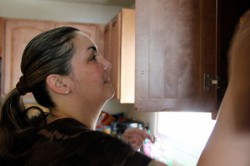Program Gives Renters Chance to Buy Foreclosed Homes
South Side non-profit rehabs vacant homes and sets up rent-to-own deals.

The Marcheses are among the first families to move into the Layton Boulevard West neighborhood’s affordable Rent to Own Homes. (Photo by Karen Slattery)
Most tenants would rather not hear from their landlords. But Kelly Marchese is not one of those renters. She says she emails or is on the phone with her landlord regularly, to talk about things such as the chain-link fence that will be installed in her backyard this summer.
Marchese rents a house on the city’s South Side that was formerly in foreclosure and vacant, through the Rent to Own Homes program. The program was made possible by a partnership between Layton Boulevard West Neighbors, Inc. (LBWN) and Impact Seven, Inc., a private, nonprofit Community Development Financial Institution (CDFI) that serves as Marchese’s landlord.
The home is one of 24 foreclosed properties that these co-developers have purchased and are rehabbing to give people such as Marchese access to affordable housing in the city.
Applicants interested in renting the homes, with the idea of eventually owning them, are screened. The monthly rent is based on income.
Tenants who live in the homes for 15 years will be given about $37,000 in credit toward the purchase price, according to LBWN Executive Director Charlotte John-Gomez.
Marchese said that once she was approved to move into the home at 2030 S. 37th St. last summer, she had a hand in making decisions about the renovations. She said she chose the yellow color of the siding, for instance. “They want you to be happy with the house,” she said.

Kelly Marchese is settled in at one of the Rent to Own Homes made available through a partnership between Layton Boulevard West Neighbors and Impact Seven, Inc. (Photo by Karen Slattery)
The Rent to Own Homes development helps bring stability to the Layton Boulevard West area, according to John-Gomez, and helps stave off some of the havoc wreaked by the foreclosure crisis.
LBWN, a nonprofit organization created two decades ago by the School Sisters of St. Francis, is charged with stabilizing and revitalizing the Silver City, Burnham Park and Layton Boulevard neighborhoods.
The agency has operated the Turnkey Renovation Program for several years, in which it buys, renovates and sells foreclosed homes in the neighborhood at affordable prices, one at a time. John-Gomez said the Rent to Own Homes program resulted from taking the Turnkey project “to scale a little bit more.”
She said that LBWN receives a list of foreclosures twice a year, adding that she “doesn’t see the trend waning at any point.”
LBWN’s co-developer, Impact Seven, Inc., was founded in northwestern Wisconsin in 1970 to aid development in low- and middle-income communities.
Todd Hutchison, who oversees the real estate development branch of Impact Seven, Inc., said that his organization and LBWN pored over lists of foreclosed homes in the area that were owned by the city of Milwaukee or by banks to find places to buy. Not all of the properties they looked at were salvageable, according to Hutchison.
Those they purchased got new roofs, windows, furnaces and wiring. New plumbing was included where needed. “We are breathing another 100 years of life into these homes,” said John-Gomez.
Foreclosures occur because people are no longer able to pay their mortgages, the upkeep or the property taxes. Abandoned buildings create problems for the neighborhoods because they fall into disrepair over time, attract vandals and drug dealers, and become a danger to children, according to Hutchison.
As the foreclosed building loses its value, so do the buildings around it, he said.
Vacant houses are not the only problem for neighborhoods such as Layton Boulevard West. So are vacant storefronts. For that reason, two foreclosed commercial buildings, located at 3513 and 3519 W. National Ave. were included in the project, in an effort “reactivate those storefronts,” according to John-Gomez.
The nearly $6 million project was made possible with loans and tax credits from organizations including the Wisconsin Housing and Economic Development Authority (WHEDA), Town Bank, the Federal Home Loan Bank of Chicago, the National Equity Fund, the Local Initiatives Support Corporation (LISC) and the city of Milwaukee.
The project is one of the finalists for this year’s Milwaukee Awards for Neighborhood Development Initiatives (MANDI), in the State Farm Building Blocks Award category, which recognizes a real estate project that improves the community.
John-Gomez described the news as “great.” Hutchinson added that he is pleased to “celebrate that we have had a little bit of an impact, even though there is a long way to go.”
According to John-Gomez, the tenants seem to like the idea of being part of a program nominated for an award.
Marchese said she is very happy in her new home and will begin painting her inside walls this spring. She said that she plans to choose earth tones and is anxious to get started.
The landlord will send a representative to her home for an inspection once a year.
Said Marchese, “I want him to say ‘wow.’”
This story was originally published by Milwaukee Neighborhood News Service, where you can find other stories reporting on fifteen city neighborhoods in Milwaukee.






















So – what happens when they can’t afford the house anymore or the grants run out? More foreclosures!!! If people can’t afford a house, they shouldn’t own a house!!! Or – You are now downgrading the value of the neighborhood which hurts the people already there. Think this through better people!!!
And what would you have in it’s place Larry? This plan puts a single family in place for 15 years! That’s a lot of years of blighted property decay you’re asking for instead. Look around at housing prices in some of Milwaukee’s neighborhoods too. $37k covers more than you’d think (though in 15 years, who knows where prices will be).
Or is your issue with flippers also running a non-profit organization?
Kyle you are so silly. You assume the families will be there for 15 years, just like the owners that were foreclosed were assumed to be there forever.
ANY neighborhood (regardless of value) is only as good as what the PEOPLE are willing to put back into it. When people put effort, $$$, pride, respect,… back into the neighborhood it will succeed. This neighborhood obviously has issues if there are drug dealers, disrepair, and vandalism. What is being done to change the attitude of the area?
One good point of this program is that there are landlords who will monitor the upkeep of the properties which will help with stability. So, if the people can no longer afford the house or leave them in disrepair, will they be evicted? What is the plan then? I honestly hope this program makes the neighborhood better, but I am afraid this will be a continuing sad story years from now.
“Applicants interested in renting the homes, with the idea of eventually owning them, are screened. The monthly rent is based on income.
Tenants who live in the homes for 15 years will be given about $37,000 in credit toward the purchase price…”
Silly me for assuming that renting meant they’d pay rent, and that the ownership of the home wouldn’t change. I don’t see apartment buildings getting foreclosed every time a tenant moves out, so I was foolishly assuming that foreclosures wouldn’t be the result here. It’s better than just turning it into a rental, because there’s at least some motivation to stay and not destroy the house, and it’s certainly better than a boarded up property owned by the city or a bank. But you’re right, clearly this non-profit needs to try to buy every house in a neighborhood. Silly them for starting small.
I believe that with proper screening and implementation this effort to restore neighborhoods and increase ownership could work. Should the homes just stay empty or boarded up and left vacant?
I like this idea…think I’m going to drop by the office tomorrow and inquire a bit further. ..